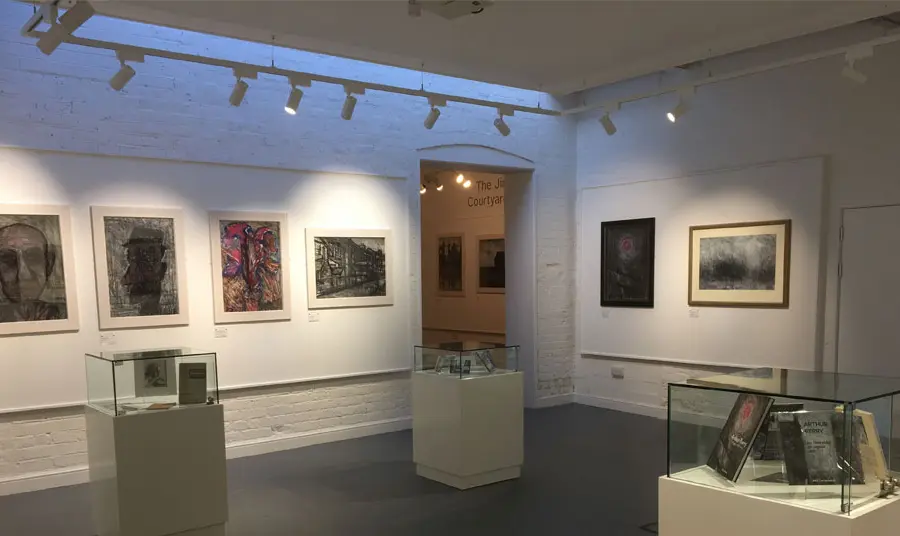
National Lottery Grants for Heritage – £10,000 to £250,000
The ambition
The Brampton is Growing project aimed to deliver an inclusive and welcoming museum, where more people could take part in activities that promote learning, creativity, healthy lifestyles and coming together as a community.
Environmental sustainability was central to the two-year redevelopment plan. By repurposing the courtyard into additional museum space, the project made use of existing buildings and materials and minimised waste.
The refurbishment also included a series of improvements to increase the building's sustainability, such as:
- installing solar roof panels
- installing air source heat pumps
- fitting LED lighting
- fitting natural vent automatic windows for cooling
- using Ecolabel-certified paper for printed materials
- using 100% recycled toilet paper and recycled plastic bin bags, which contain farm waste polythene
The organisation
The Brampton Museum, set within Brampton Park, is Newcastle-under-Lyme’s local history museum featuring over 2,000 years of Borough history.
The museum is operated by Newcastle-under-Lyme Borough Council. It worked with local contractors including Sandycroft and Groundwork to build local partnerships and reduce the need for long-distance travel.
The funding
The project cost just over £870,000 with £381,000 provided by Newcastle-under-Lyme Borough Council and £248,700 from The National Heritage Lottery Fund.
With funding secured, the project started in 2021 and the museum fully reopened to the public on 28 May 2022.
The results
The project has significantly reduced the museum’s impact on the environment, even after growing in size. Before works began, an environmental impact survey reported an operational rating of D. Following the refurbishment, the museum received an improved rating of B.
Working together for the environment
The museum worked with other organisations and partners to reuse things that were not needed. For example, when updating the children’s play equipment, unwanted items were donated to a local children’s charity.
Also, a council-run partnership was set up to collect food waste, with salad going to the Brampton Park aviary as food for the birds.
Although setting up the partnerships was time-consuming, they operate well and provide long-term benefits to partners and communities while helping the museum to reduce its waste.
Meeting our outcomes
With more capacity, the museum can support more people from the community to meet others for enjoyment and to learn new skills. The museum saw an increase in visitors in the year it reopened when compared with the same quarter in 2019.
New volunteering roles were created to welcome people to the galleries, including exhibition guides and storytellers. Volunteers increased from 10 to over 30, with many reporting in a survey benefits including improved knowledge, employment prospects and happiness.
The eco-friendly capital works and partnership programmes demonstrate the museum’s commitment to long-term environmental sustainability and are helping to tackle the climate crisis.
We are very proud of the museum, and the work and enthusiasm of its staff and volunteers.
Simon Tagg, Leader of Newcastle-under-Lyme Borough Council
The future
Following this project The Brampton Museum won the Ethical, Responsible & Sustainable Tourism Silver Award at the Enjoy Staffordshire awards.
Simon Tagg, Leader of Newcastle-under-Lyme Borough Council, says: “We are very proud of the museum, and the work and enthusiasm of its staff and volunteers. I’m delighted to see it take its place among the best attractions in Staffordshire.”
Having built strong relationships during the first project, the museum will continue to work with Groundwork and Staffordshire Wildlife Trust to offer support sessions for the local community, including:
- eco therapy classes for older people
- musical memories to support those with dementia
- support for families affected by the cost of living
The Brampton Museum has also received £20,000 to deliver a project in summer 2023 to improve the wildlife habitat within its garden and pond area.
Top tips
The team share some useful tips for similar projects:
- Start by focusing on the small things you can achieve, such as using recycled paper, improving your recycling on-site and moving away from single-use plastic in your café.
- Find out who could be your local partners and suppliers for works, materials and goods.
- Ask yourself: Can we reuse existing structures/materials rather than build new?
- Donate unwanted items and materials – someone out there will have a use for them.
- Tell people about the small changes you have made to inspire others to be more sustainable.

